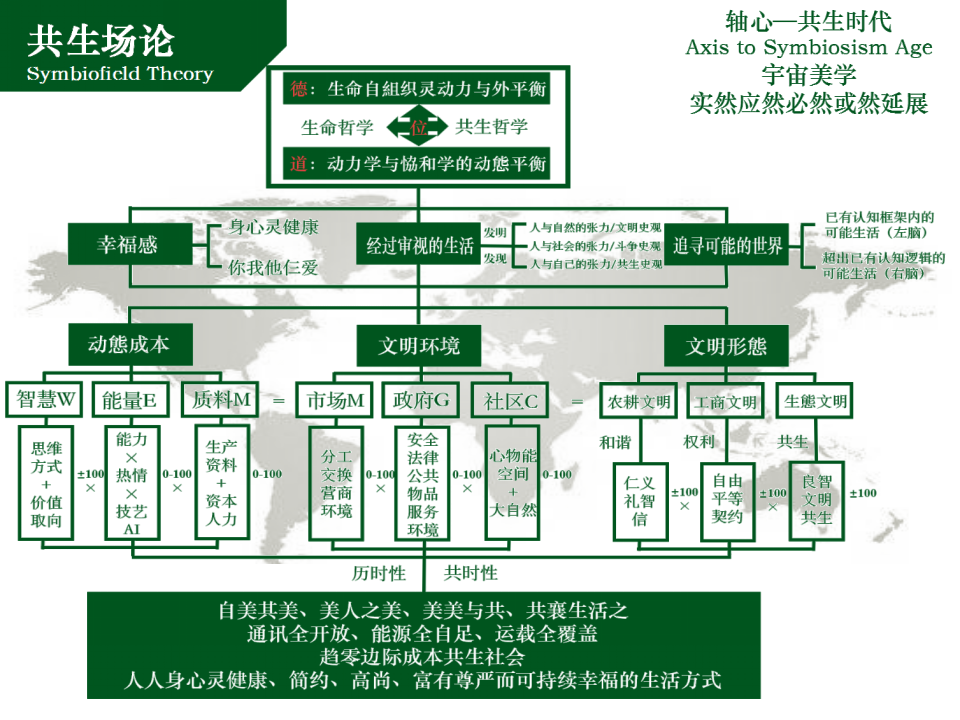New Articles
-
 经济学的认知偏蔽与分化催生新思维 2026/02/24
经济学的认知偏蔽与分化催生新思维 2026/02/24【共生经济学·前言】 经济学的认知偏蔽与分化催生新思维 The Cognitive Bias and Fragmentation of Economics as...
-
 如何面对“终极的免费午餐”? 2026/02/22
如何面对“终极的免费午餐”? 2026/02/22《共生经济学》自序 如何面对“终极的免费午餐”? How Should We Face the “Ultimate Free Lunch”? 一、从宇...
-
 全球共生范式下的现代正常国家 2026/02/17
全球共生范式下的现代正常国家 2026/02/17全球共生范式下的现代正常国家 Modern National Normalization under the Global Symbiotic Paradigm ...
-
 论殖官主义:政权更迭为何不能终结人民的苦难? 2026/02/16
论殖官主义:政权更迭为何不能终结人民的苦难? 2026/02/16论殖官主义:政权更迭为何不能终结人民的苦难? Chinese Reproductive Officialdom: Why Regime Change Has Not...
共生思想理论前沿
THE THEORY
-

-

-

-
 关于中文“共生”翻译及对应的人、事、物之说明
关于中文“共生”翻译及对应的人、事、物之说明关于中文“共生”翻译及对应的人、事、物之说明 ——Symbiosism:Charles Thomas Taylor &Qian hong又一次量子缠绕...
查看详细说明
Speech
-
 三大自组织货币的共生格局——宏观世界之数字货币 2021/07/08
三大自组织货币的共生格局——宏观世界之数字货币 2021/07/08三大自组织货币的共生格局 ——宏观世界之数字货币 钱 宏 The Institute for Global Symbiosism(...
-
 新汉字yǜ的释义 2019/11/16
新汉字yǜ的释义 2019/11/16语从金音玉(Yǜ):金口玉言,一诺千金,性人诚恳、执信; &n...
-
 钱宏:中国的真实经验与未来走向(凤凰博报专... 2019/11/16
钱宏:中国的真实经验与未来走向(凤凰博报专... 2019/11/16点击播放 中国的真实经验与未来走向《凤凰博报》专访钱宏主持人:...
迈向新世界秩序:以社区生态主权取代地缘政治主权
发布时间:2025/06/23 公司新闻 浏览次数:172
Towards a New World Order: Replacing Geopolitical Sovereignty with Community Ecological Sovereignty
迈向新世界秩序:以社区生态主权取代地缘政治主权
By Archer Hong Qian(钱 宏)
Intersubjective Symbiosism Foundation(CANADA)
鉴于现行主权国家概念,不但没能解决地缘(土地、人口、民族、宗教)冲突,如俄乌、以伊(以哈、以叙)、台海、朝韩等,无法限制某些大国、强国自行宣称别国为自己的“一部分”,甚至要把某国“从地球抹去”等强权行径,而且导致全球化2.0“互害机制”的出现,如中美经贸背后的乡村败落、产业空心等,基于生命自组织连接平衡与再平衡的交互主体共生(Intersubjective Symbiosism)思想,提出以“社区生態主权”取代“土地人口主权”的世界秩序,化解地缘冲突、贸易纠纷之可行性!
Given that the current concept of sovereign nation-states has failed to resolve geopolitical conflicts—those rooted in land, population, ethnicity, and religion—such as the Russia-Ukraine war, Israel-Iran (including the Israel-Hamas and Israel-Syria tensions), the Taiwan Strait issue, and the North-South Korea standoff, and has been unable to restrain certain major powers from unilaterally declaring other nations as “part of their territory” or even threatening to “wipe them off the map,” it has also led to the emergence of the “mutually harmful mechanisms” of Globalization 2.0—such as rural decline and industrial hollowing-out behind U.S.-China economic entanglements.
In response, drawing from the philosophy of Intersubjective Symbiosism—which emphasizes the self-organizing balance and rebalancing of life—it is proposed that a new world order based on Community Ecological Sovereignty replace the outdated paradigm of Territorial-Population Sovereignty, offering a feasible path to resolving both geopolitical conflicts and trade disputes.

这个问题触及了当今世界政治与经济体系深层的结构性矛盾,并提出了一个具有启发性的新范式:“社区生态主权”替代“土地人口主权”。以下我将从概念厘清、现行体系的问题、社区生态主权的内涵与可行性、以及可能的落地路径等角度作系统分析。
一、现行“土地人口主权”的基本问题
当前主权国家制度起源于1648年《威斯特伐利亚和约》,核心逻辑是“国家拥有对其疆域内的土地、资源、人口的绝对权威”,以领土完整与民族统一为基本原则。这一体系在冷战后全球化的推动下,逐渐暴露出几个致命矛盾:
1、地缘政治难题难解
民族与宗教矛盾(如以色列与伊斯兰国家、印度与巴基斯坦)
边界争端和历史问题(如俄乌、台海、南海、朝韩)
各国都以“主权不可让渡”为正当理由,陷入零和博弈,缺乏妥协机制。
2、全球化的互害机制
供应链全球化导致产业空心化(如美中之间的“脱钩”讨论)
资本追逐成本最优带来的乡村凋敝、文化破碎
环境破坏:主权国家只为本国经济增长负责,缺乏全球协同机制。
二、“社区生态主权”概念的解析
“社区生态主权”(Community Ecological Sovereignty)构想,可视为一种去疆域化、去中心化、跨国家组织的治理新范式,它的核心逻辑包括:
- 主权单位的转换:从国家 → 社区
社区不再依据“地理疆域”划定,而是基于价值认同、生态命运共生体、产业协作圈等形成新的“政治生态单元”。
社区可以是跨国的(如某生态流域、文化走廊),也可以是超国家的网络(如产业链合作体、生态保护组织)。
- 主权基础的转换:从土地人口 → 生态与交互
不再以“谁拥有这块地、多少人口”为政治合法性,而是以社区内部的“生态共生、资源共享、决策协同”为治理正当性。
重:点转向环境可持续性、社区韧性、公平互惠。
- 治理逻辑:自下而上的协商机制
类似“数字DAO”或生态合作社式的治理机制。
强调协商、透明、公正,而非传统的垂直强制。
三、化解地缘冲突与全球化困局的可行路径
| 问题 | “社区生态主权”可能的解决机制 |
| 俄乌冲突 | 在黑海流域构建“跨国生态与能源社区”,超越俄罗斯与乌克兰国家身份,聚焦资源治理与文化融合。 |
| 以哈/以伊冲突 | 创建“耶路撒冷生态文化区”,由多方治理、宗教共治,减少对单一国家主权的依赖。 |
| 台海问题 | 构建“两岸生态共生体”或“海峡科技文化合作带”,先形成功能性互惠的网络社区。 |
| 中美脱钩 | 在某些产业(绿色能源、AI、粮食安全)中构建“全球产业生态圈”,弱化国家边界、强化生态主权。 |
四、实施路径与制度构想
1、建立“多主权网络治理体”
如城市联盟(C40 Cities)、跨境流域治理组织(多瑙河委员会、湄公河治理平台)
支持以社区为单位的“主权试验区”(例如生态共生体、数字主权平台)
2数字治理与DAO赋权
利用区块链、AI、协同平台建设分布式治理系统,防止传统主权的垄断和操控。
3、推动国际法规和认知框架更新——制定《全球共生公约》
修正《联合国宪章》与《世界贸易组织协定》,承认生态/数字/社区主权为合法单位。
4、开展教育与舆论重构
打破民族主义与地缘意识形态,强化生态命运共生体、人类共识、公平贸易等教育。
五、挑战与反思
| 挑战 | 内容 |
| 合法性困境 | 如何获得现有主权国家的认可与授权? |
| 治理效能问题 | 多中心治理是否会降低决策效率? |
| 安全边界模糊 | 无主权国家是否会削弱国家防御与安全保障机制? |
| 大众认同感构建难 | 传统民族认同是国家的基础,如何构建超越国家的社区认同? |
六、结语:走向“主权2.0”世界秩序
“社区生态主权”不是完全取代主权国家,而是在数字时代、气候危机、全球经济深度融合的背景下,对主权进行重构与补充。从“零和的地缘主权”向“共生的生态主权”转变,是未来世界秩序迈向和平与可持续的可能路径之一。
2025年6月23日晨初稿于Lisboa The 7 H0tel
Towards a New World Order: Replacing Geopolitical Sovereignty with Community Ecological Sovereignty
By Archer Hong Qian | Intersubjective Symbiosism Foundation
I. The Problem with the Current Concept of Territorial-Population Sovereignty
The modern notion of state sovereignty—born out of the 1648 Treaty of Westphalia—centers on the absolute authority of the state over its land and people. In practice, this model has revealed structural limitations, especially under Globalization 2.0:
Geopolitical Stalemates
Ethnic and religious tensions (e.g., Israel vs. Iran, India vs. Pakistan)
Border disputes and historical conflicts (e.g., Russia-Ukraine, Taiwan Strait, Korean Peninsula)
“Non-negotiable sovereignty” leads to zero-sum logic and deadlocks.
Mutually Harmful Globalization
Industrial hollowing and rural decline (e.g., U.S.–China trade decoupling)
Global supply chains maximize profit but destroy local resilience.
Environmental damage as states prioritize domestic GDP over global sustainability.
II. Defining “Community Ecological Sovereignty”
The concept of Community Ecological Sovereignty proposes a paradigm shift: away from land and population-based sovereignty toward interactive, ecological, and community-based legitimacy.
Shift in Sovereign Unit: From Nation-States to Communities
Communities are defined not by borders but by shared values, ecological interdependence, or collaborative economies.
These can be cross-border (e.g., watershed communities) or transnational networks (e.g., industrial ecosystems).
Shift in Legitimacy: From Territory and Demography to Ecology and Interaction
Political legitimacy stems from sustainable interaction, collaborative governance, and shared resources—not territorial control.
Key values: environmental sustainability, mutual resilience, and equitable exchange.
Shift in Governance Logic: From Top-Down to Distributed Negotiation
Inspired by DAO (Decentralized Autonomous Organization) models and ecological cooperatives.
Prioritizes transparency, participation, and fairness over centralized enforcement.
III. Conflict Resolution and Global Rebalancing Through Community-Based Solutions
| Global Conflict | Community Ecological Approach |
|---|---|
| Russia-Ukraine | Black Sea Basin Energy and Culture Community |
| Israel-Palestine-Iran | Jerusalem Ecological Cultural Zone with multi-faith governance |
| Taiwan Strait | Cross-Strait Ecological Coexistence Zone / Technology-Culture Corridor |
| U.S.-China Trade Decoupling | Green Energy and AI-based Transnational Industrial Ecosystems |
IV. Implementation Pathways
Polycentric Sovereignty Networks
City alliances (e.g., C40 Cities), watershed governance (e.g., Danube or Mekong Committees)
Pilot Sovereignty Sandbox Zones for ecological or digital governance experiments
Technological Infrastructure
Use of blockchain, AI, and Web3 tools to build decentralized governance platforms
Avoids traditional power monopolies through algorithmic transparency
Legal Recognition and International Frameworks——Global Symbiosis Convention
Revisions to the UN Charter and WTO Agreements to accommodate digital/ecological/community-based sovereign actors
Cognitive and Educational Transformation
Replace nationalism and territorial ideology with shared human destiny, ecological literacy, and fair trade education
V. Challenges and Strategic Reflections
| Challenge | Explanation |
|---|---|
| Legitimacy Dilemma | How to gain recognition within the current nation-state framework? |
| Governance Efficiency | Will multi-centric governance slow down decision-making? |
| Security Ambiguity | Could weakened nation-states risk collective security? |
| Identity Formation | How to foster shared identity beyond ethnic or national categories? |
VI. Conclusion: From Sovereignty 1.0 to Sovereignty 2.0
“Community Ecological Sovereignty” does not seek to abolish the nation-state, but to reframe sovereignty in the age of digital interdependence, ecological crisis, and post-globalization transformation.
A peaceful and sustainable world order requires moving beyond zero-sum territorial sovereignty toward interactive, community-based, and symbiotic sovereignty. This is not utopia—it is the logical evolution of governance under the pressures of climate, technology, and civilization itself.
2025年6月23日晨初稿于Lisboa The 7 H0tel
上一篇: 世界史:生命自组织交互共生的再平衡进程
下一篇: 遣返、消化、改变三大策略并举













您好!请登录
已有0评论
购物盒子